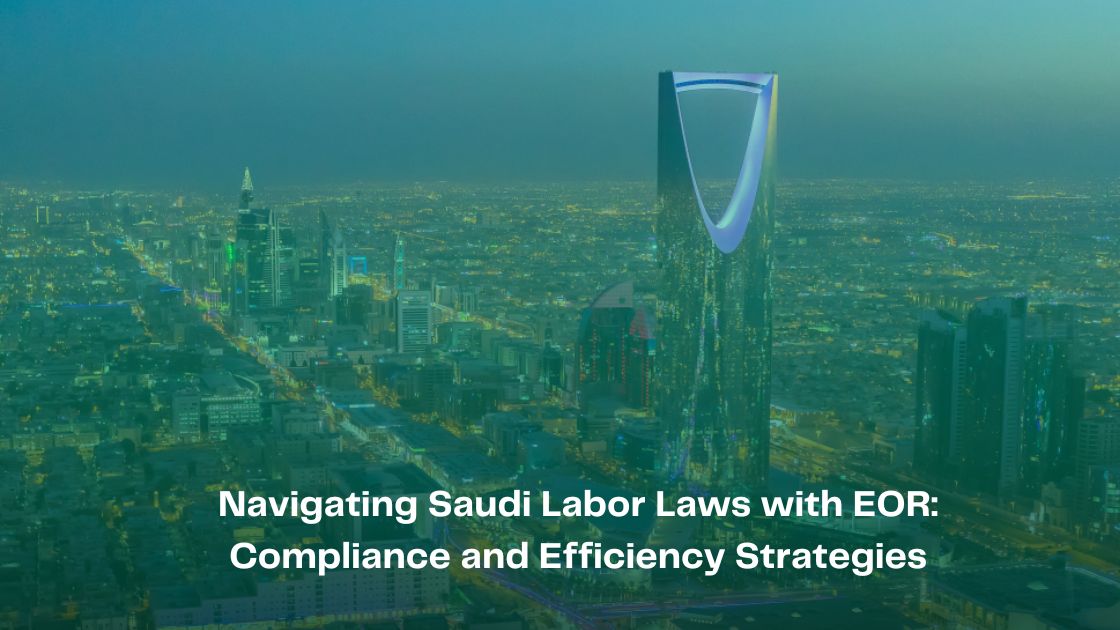Introduction:
In recent years, Saudi Arabia has seen significant updates and revisions to its labor laws, impacting both local businesses and international companies operating within the kingdom. With stringent regulations in place, compliance is crucial for businesses to avoid penalties and legal issues. In this blog post, we’ll explore how leveraging an Employer of Record (EOR) can streamline compliance efforts and ensure efficiency in navigating Saudi Arabia’s complex labor laws.

Understanding Saudi Arabia Labor Laws:
Saudi Arabia’s labor laws are governed by the Ministry of Human Resources and Social Development (MHRSD), aiming to protect the rights of employees while facilitating a conducive environment for businesses. Key aspects of Saudi labor laws include:
-
Employment Contracts:
-
-
- All employment agreements must be documented in writing, specifying terms and conditions.
- Contracts should comply with Saudi labor regulations, including provisions for wages, working hours, and benefits.
-
-
Working Hours and Overtime:
-
-
- The standard working week in Saudi Arabia is 40 hours, typically spread over five days.
- Overtime work is compensated at a higher rate, often 150% of the regular hourly wage.
-
-
End of Service Benefits (ESB):
-
-
- Employers are required to provide ESB to employees upon termination of employment, calculated based on the duration of service.
-
-
Saudization:
-
- Saudization initiatives aim to increase the employment of Saudi nationals in the private sector.
- Certain industries have quotas mandating the employment of a minimum percentage of Saudi nationals.
Leveraging EOR for Compliance:
Employers, especially those new to the Saudi market, often face challenges in ensuring compliance with labor laws. Partnering with an EOR offers several advantages:
- Expertise in Local Regulations: EORs possess in-depth knowledge of Saudi labor laws and regulations, ensuring that employment practices align with legal requirements.
- Handling Payroll and Benefits: EORs manage payroll processing, including tax deductions and ESB calculations, relieving businesses of administrative burdens. They also facilitate benefits administration, ensuring compliance with statutory requirements.
- Saudization Compliance: EORs assist businesses in navigating Saudization requirements, helping to recruit, train, and retain Saudi nationals to meet quotas.
- Risk Mitigation: By outsourcing employer responsibilities to an EOR, businesses mitigate the risk of non-compliance and potential legal repercussions.
Efficiency Strategies with EOR:
In addition to ensuring compliance, partnering with an EOR can enhance operational efficiency:
- Focus on Core Activities: With EOR managing HR functions, businesses can focus on core activities and strategic initiatives, driving growth and innovation.
- Scalability and Flexibility: EOR services are scalable, allowing businesses to expand or downsize their workforce rapidly without administrative hurdles.
- Access to Talent: EORs often have extensive networks, providing businesses access to a pool of qualified talent, both locally and internationally.
- Market Entry Support: For companies entering the Saudi market, EORs offer valuable support and guidance, simplifying the process of establishing a presence in the kingdom.
Data-Driven Insights:
According to recent surveys and data analysis:
- 78% of businesses in Saudi Arabia struggle with HR compliance due to complex labor laws.
- Companies leveraging EORs report a 30% reduction in administrative overhead related to HR and payroll management.
- Saudization compliance rates increase by an average of 20% among businesses utilizing EOR services.
Conclusion:
Navigating Saudi Arabia’s labor laws can be challenging for businesses, especially those unfamiliar with local regulations. Partnering with an EOR provides a strategic solution, ensuring compliance with labor laws while enhancing operational efficiency. By leveraging the expertise of an EOR, businesses can mitigate risks, streamline HR processes, and focus on driving growth in the dynamic Saudi market.
